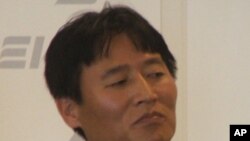"I was caught listening to foreign broadcasting. And if I listened to foreign broadcasting, I could have been taken back to the political camp where I stayed for 10 years. I did not want to go back."
For most observers, the quest to understand life inside North Korea is akin to studying a manuscript viewed through thick, frosted glass. Through fear and secrecy, the North Korean regime has maintained an iron grip on a nation that has nuclear capabilities while lacking many of the basic necessities of life for the majority of its residents.
|
Kim Kwang-jin
|
|
|
Kim Kwang-jin has been described as the first English-proficient defector ever to escape North Korea. He is a visiting fellow with the Committee for Human Rights in North Korea based in Washington. The 43-year-old Kim was a banker with the Northeast Asia Bank and Korea National Insurance Corporation. He had a rare view of huge financial transactions and accounts worth millions of dollars.
But Kim sought freedom, and was able to take his family from Singapore in 2003 to Seoul, South Korea. He says while he was able to know what life outside of North Korea was like, most residents there have little idea of just how hard their lives are. "Some of them, they know that their life is more miserable than in the past. But the majority of the people, they do not have a very clear picture of the outside," he said.
Kim says North Koreans are almost entirely sequestered from the rest of the world while being oppressed and famished. But he says ordinary citizens there remain hungry for freedom, and they are increasingly heading for China by bribing border guards. "If they are caught, they should risk execution. But the food situation, the rationing there is so difficult that even those who bought the border guards, they received the bribe, so they guide them across the border. So nowadays it is pretty easy to cross it (the border)," he said.
Kang Cheol-hwan had a much different path out of North Korea. In 1977 when he was 10 years old, Kang said he and his family were thrown into a prison camp. "I was in North Korea and my parents became political criminals (prisoners). The whole family went to a sort of North Korean gulag, which is called Yeoduk. It is a prison camp in North Korea. I was in Yeoduk prison camp for 10 years, but was then freed. I listened to foreign (radio) broadcasting and that drove me to get out of North Korea," he said.
Kang says in North Korea, the regime aims to punish three generations of political prisoners to so-called "eradicate the seed of revolt." And he says the camps are meant to break their spirits and give up hope of being treated as human beings. Kang witnessed many atrocities including malnutrition and executions. His family was released after 10 years.
Kang fled after it was discovered he was listening to a radio. "I was caught listening to foreign broadcasting. And if I listened to foreign broadcasting, I could have been taken back to the political camp where I stayed for 10 years. I did not want to go back. And at the time I could not even think of my family because I did not want to go back to the political camp. And at the time I was young," he said.
In part two of this report, we follow Kang to his new life out of North Korea and hear about the long, difficult journey defectors must make as they build a new life.





